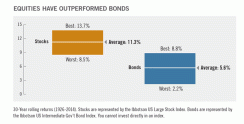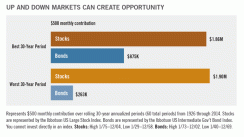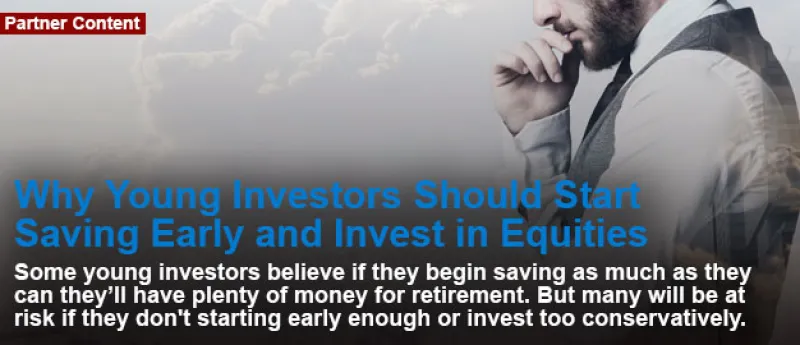Some young investors believe if they begin saving as much as they can they’ll have plenty of money when it comes time to retire. That’s a good start, but many of today’s youngest investors are at risk of not having enough assets at retirement because they are not starting early enough or are too conservative with their investments.
THE CHALLENGE OF GETTING FROM HERE TO THERE
A study by Prudential found that millennials, investors in their 20s and early 30s, expect to retire at age 67 and will need about $1 million to fund their retirement.1 Yet there seems to be a disconnect between how much these investors say they’ll need to retire and how they’re going about achieving it.
Most troubling, according to the survey, is that more than 40 percent of millennials are not saving for retirement at all. This generation, which has been hit hard by heavy student loan debt and reduced incomes due to lackluster employment and economic conditions, has been hard pressed to set aside the assets they’ll need to meet their retirement goals. And those who have started saving may not be making the most advantageous investment choices. Younger investors might learn a thing or two from retirees who, not surprisingly, advise to start saving early and put away more. Nearly 20 percent of retirees surveyed also wished they had invested more aggressively.2
ARE MILLENNIALS TOO RISK AVERSE?
Whether turned off by the financial crisis of 2008 or lacking an understanding of the long-term track record of stock investments, many young investors tend to be risk averse and sensitive to market volatility. In fact, a survey from Accenture found that 43 percent of millennial respondents described themselves as “conservative” investors, compared with just 31 percent of baby-boom respondents.3
But if younger investors hope to reach their retirement savings goals, most of them will have to begin tilting their portfolios more heavily toward equities. Millennials invested through their employer-sponsored retirement plans may be headed in the right direction. These investors have about 75 percent equity exposure in their workplace retirement plans4, but some experts say this is still too low.

TIME IS ON THEIR SIDE
Since young investors have the benefit of 30-plus years until retirement, they shouldn’t be as concerned with equity market volatility. “Equities have historically outperformed bonds and have generated strong returns over rolling 30-year periods. Plus, the average equity return is double that of the average bond return,” says Michael Rosenberg, head of IODC Distribution at Prudential Investments. Even going back to 1926, the lowest 30-year equity market return was still very competitive at 8.5%, and in line with the highest bond market return period.

When your investment horizon stretches well into the future as it does for millennials, equity market fluctuations can work in your favor. “In the end,” says Mr. Rosenberg, “as long as an investor keeps making contributions, the growth in a stock portfolio can be substantial compared with bonds, regardless of market conditions, due to the benefits of dollar cost averaging and the compounding of returns.”
TAKING THE EMOTION OUT OF INVESTING
“It’s not surprising that many millennials are investing too conservatively,” said Jeremy Stempien, product specialist on QMA’s asset allocation team. “They tend to make investment decisions based on emotions and experiences rather than their actual capacity or ability to take on risk.”
One way to address this situation is to allow professionals to assume the role of allocating assets. Target date funds aim to accomplish just that. “Target date funds can potentially help bridge the gap between the willingness and ability of young investors to take on risk,” noted Mr. Stempien. “A target date fund automatically adjusts the asset mix for an investor. They’re heavily weighted towards stocks early in the investor’s life when he or she has the capacity to take on more risk, and they become more conservative as the investor approaches retirement.”
“Millennials face significant financial challenges,” says Mr. Rosenberg. “But they have the advantage of time on their side and by starting now, saving more—and allocating a higher percentage to equities early on—they stand a better chance of accumulating the assets they’ll need for retirement.”
DEFINITIONS
Dollar cost averaging is the investing technique of purchasing an investment on a regular basis, regardless of price, enabling an investor to purchase more shares when prices are low, and fewer shares when prices are high.
Ibbotson US Intermediate Gov’t Bond Index is an unweighted index which measures the performance of five-year maturity US Treasury Bonds.
Ibbotson US Large Stock Index is an unweighted index which measures the performance of
large cap stocks.
RISKS
Investing in equities involves risk. Some stocks are riskier than others. The investment return and principal value will fluctuate, and shares, when sold, may be worth more or less than the original cost and it is possible to lose money. Past performance does not guarantee future results. Asset allocation and diversification do not assure a profit or protect against loss in declining markets.
The target date is the approximate date when investors plan to retire and may begin withdrawing their money. The asset allocation of the target date funds will become more conservative as the target date approaches by lessening the equity exposure and increasing the exposure in fixed income type investments. The principal value of an investment in a target date fund is not guaranteed at any time, including the target date. There is no guarantee that the fund will provide adequate retirement income. A target date fund should not be selected based solely on age or retirement date. Participants should carefully consider the investment objectives, risks, charges and expenses of any Fund before investing. Funds are not guaranteed investments and the stated asset allocation may be subject to change. It is possible to lose money by investing in securities, including losses near and following retirement.
1&2Prudential, “Financial Literacy and Retirement Readiness Study,” 2014.
3Accenture, “Generation D: An emerging and important investor segment,” 2013.
4Eempolyee Benefit Research Institute, “401(k) Plan Asset Allocation, Account Balances, and Loan Activity,” 2013.





